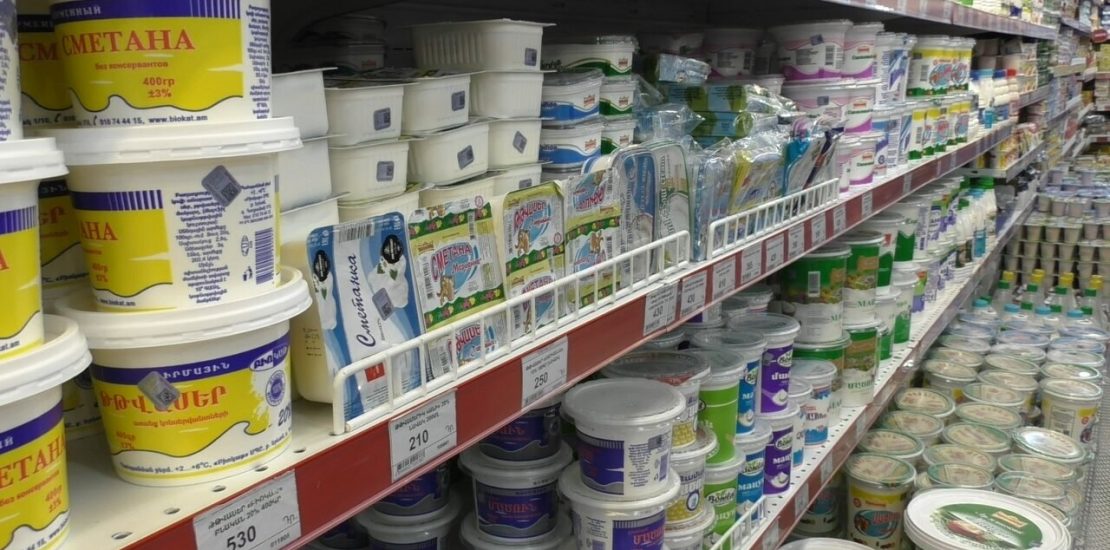- 11 May, 2023
- Eurasian Economic Union, Economy and Energy

From April 5, 2023, the import of Armenian dairy products was banned in Russia. The reason, according to the Federal Service for Veterinary and Phytosanitary Supervision of the Russian Federation (Rosselkhoznadzor), is “unsatisfactory results of the parties’ negotiations and inspections”.
What does this mean for Armenia and what effect will the export ban to Russia have on the local producer?
It is no secret that the main destination of dairy product export from Armenia is Russia, and the ban on exports to that direction will create serious problems for the local producer. Therefore, let us try to assess the volumes.
Volumes
After the invasion of Ukraine, economic sanctions were imposed against Russia, and Armenia inadvertently became a re-exporting country. This is evidenced by statistical data.
In 2022, the volume of goods exported to the Russian Federation increased almost 3 times compared to 2021, while the industry in Armenia grew by only 7.9 percent.
As for the exported dairy products, in 2020, 11.2 million of the exported dairy products with a total value of $ 12.4 million were sent to Russia, and in 2021, 15.3 million of the of the total volume worth $16.8 million were exported to Russia. It is obvious that the main consumer of Armenian dairy products (in addition to Armenia) is the Russian market.
And already in 2022, $32.1 million worth of dairy products were exported from Armenia, of which $30.1 million worth of products were sent to Russia.
To make it clearer, against the background of a double increase in the export of dairy products in 2022 compared to 2021, the production of dairy products in Armenia increased by about 16 percent, of which the production of the main exported product, cheese, increased by only 3.1 percent. In other words, it is obvious that a significant portion of the dairy products exported last year were re-exported dairy products.
Iranian origin
The main types of dairy products exported from Armenia are cheese, butter and dairy-based oils.
In 2022, the export volume of dairy products has almost doubled to $ 32.1 million. Re-exported dairy products have a large share here, most of them of Iranian origin. However, there has been no change in the geography of exports. Dairy products with a total value of $ 30.1 million were exported to Russia.
This year has also seen significant activity. In January alone, according to the Statistical Committee, more than $17.4 million worth of dairy products were exported from Armenia. Naturally, most of it was sent to Russia.
At the end of March, the Russian side announced that ingredients of Iranian origin were found in the dairy products, on which “Rosselkhoznadzor” has imposed restrictions.
In response to this statement, the Food Safety Inspectorate of the Republic of Armenia informed that the entire dairy production chain is properly controlled by the inspection body, and no issues that would threaten human life and health were identified.
Minister of Economy Vahan Kerobyan also announced that Armenian producers use Iranian raw materials, and there are Iranian organizations that are in the Eurasian register, and it is allowed to import milk cream from them and use it in products exported to Russia.
Thus, taking into account the circumstances listed above, the statements of officials and state bodies, it can be assumed that Russia’s ban on the import of dairy products has more of a political connotation, and this assumption has several grounds.
As we can see, Armenian dairy producers are highly dependent on the Russian market; therefore, the local producer will face serious problems due to the import ban. This will lead to a reduction in production volumes, job cuts, and social problems arising from it.
On the other hand, “Rosselkhoznadzor” carried out inspections on the products of only 2 manufacturers, but as a result of the detected issues, it made a decision to ban the import of the products of all Armenian manufacturers. This also proves that such a decision has more political implications.
Will the situation be resolved?
During the recent meeting between the heads of the Food Safety Inspectorate of the Republic of Armenia and “Rosselkhoznadzor” in Moscow, a decision was made to resolve the issue in stages.
Thus, the organizations that produce dairy products in Armenia using only local raw materials allowed in Russia, and that will meet the established requirements as a result of inspections by the Inspectorate, will be considered by “Rosselkhoznadzor” for exporting their products.
If implemented, this will give an opportunity to restore the volume of Armenian dairy products exports to the Russian market in a certain period of time. However, given the apparent political reasons, it is difficult to predict whether the issue will be resolved.
“Legal grounds” behind the ban
According to the provisions of Article 28 of the Treaty on the Eurasian Economic Union, member states shall have the right to apply restrictions on mutual trade of goods (provided that these measures are not a means of unreasonable discrimination or a disguised restriction on trade), if these restrictions are necessary for:
1․ protection of human life and health;
2․ protection of public morality and law,
3․ environmental protection;
4․ protection of animals and plants, cultural values;
5․ fulfillment of international commitments;
6․ protection of the country and ensuring the security of the member state.
On the grounds mentioned in the first clause of the above-mentioned article, sanitary, veterinary and quarantine phytosanitary measures can be implemented in the domestic market, as well as the circulation of certain categories of products can be restricted.
Accordingly, the ban on the import of dairy products of Armenian production by “Rosselkhoznadzor” was “adjusted” to the regulations of this clause.
Sevada Ghazaryan
Union of Informed Citizens




